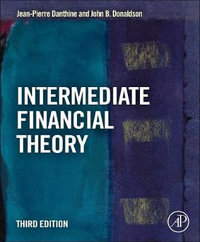Despite the vast research literature on topics relating to contract theory, only a few of the field's core ideas are covered in microeconomics textbooks. This long-awaited book fills the need for a comprehensive textbook on contract theory suitable for use at the graduate and advanced undergraduate levels. It covers the areas of agency theory, information economics, and organization theory, highlighting common themes and methodologies and presenting the main ideas in an accessible way. It also presents many applications in all areas of economics, especially labor economics, industrial organization, and corporate finance. The book emphasizes applications rather than general theorems while providing self-contained, intuitive treatment of the simple models analyzed. In this way, it can also serve as a reference for researchers interested in building contract-theoretic models in applied contexts.The book covers all the major topics in contract theory taught in most graduate courses. It begins by discussing such basic ideas in incentive and information theory as screening, signaling, and moral hazard. Subsequent sections treat multilateral contracting with private information or hidden actions, covering auction theory, bilateral trade under private information, and the theory of the internal organization of firms; long-term contracts with private information or hidden actions; and incomplete contracts, the theory of ownership and control, and contracting with externalities. Each chapter ends with a guide to the relevant literature. Exercises appear in a separate chapter at the end of the book.
Industry Reviews
"An extremely impressive synthesis of the ideas that make up modern contract theory. It will undoubtedly be the definitive text on the topic for many years to come."--Oliver Hart, Andrew E. Furer Professor of Economics, Harvard University ' Contract Theory is certainly the most important textbook on the frontiers of microeconomics since Tirole's celebrated Theory of Industrial Organization. Bolton and Dewatripont have done a marvelous job of providing an exhaustive account of the field, using only very simple and self-contained models and relying on a whole battery of economic applications. All this contributes to making the book not only the unavoidable teaching and research reference on contract theory, but also a unique tribute to economics at its best.' Philippe Aghion , Department of Economics, Harvard University "Barter is the oldest form of economic exchange, but, in the modern world, it has largely been superseded by monetary and credit transactions. Nevertheless, Dalia Marin and Monika Schnitzer make a compelling and intriguing case that, if planned with care, barter can play a valuable role in both international trade and transitional economies."--Eric S. Maskin, A.O. Hirschman Professor of Social Science, Institute for Advanced Study "Herve Moulin is one of the deepest thinkers in welfare economics. His book on fair division is an elegant overview of modern contributions to an ancient problem."--Eric S. Maskin, A.O. Hirschman Professor of Social Science, Institute for Advanced Study "Evans and Schmalensee's *Paying with Plastic* provides a rigorous analysis and deep insights about the payment card industry's fascinating institutional features. This book will appeal not only to policy-makers and business executives, but also to the theoretically inclined economist. The second edition incorporates much new material, including recent advances to two-sided market economics (to which the authors have made substantial contributions). A remarkable achievement."--Jean Tirole, Institut d'Economie Industrielle, University of ToulousePlease note: This new quote arrived too late for the jacket, so the first quote will be used there. This version should be used for all other purposes. Thanks! "This is as edifying a course on contract theory as a primer could ever hope to be -- the little book that could."--Bengt Holmstrom, Paul A. Samuelson Professor of Economics, MITPlease note: Arrived too late to appear on book jacket. "Google, eBay, mobile phones, and the Xbox have a lot more in common that you might suspect. *Invisible Engines* builds on recent thinking about two-sided platforms, including the authors' substantial contributions to it. Evans, Hagiu and Schmalensee beautifully blend economics, history, and business analysis to shed light on how businesses and policy makers should design their strategies. This exciting book will be a key resource for practitioners and academics interested in knowing how software platforms work and where information technologies are heading."--Jean Tirole, Institut d'Economie Industrielle, University of Toulouse "*Invisible Engines* describes the economics of operating systems, those fiendishly complex pieces of software that provide the nervous system for computers, cell phones, game consoles, and a host of other devices. It is a must-read for anyone who wants to understand the economic forces that drive high-tech industries."--Hal Varian, Haas School of Business and Department of Economics, University of California, Berkeley

























